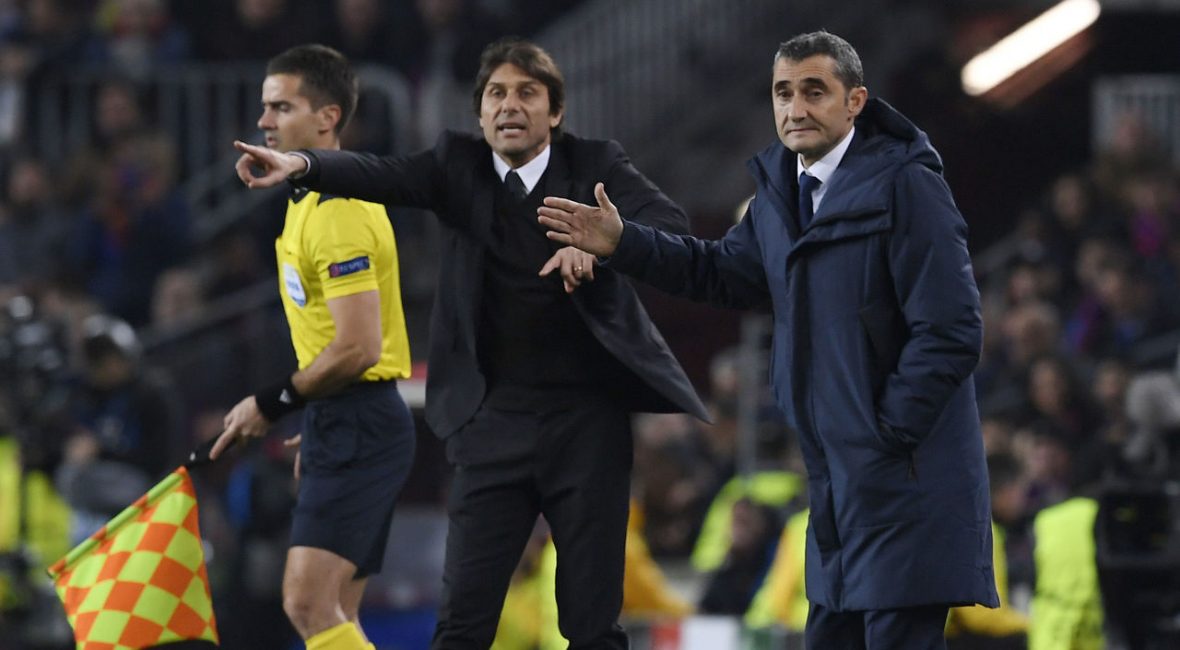Antonio Conte was not talking about Leo Messi, but he might as well have been. “Everyone is good at asking questions,” the Chelsea manager told Corriere della Sera last May. “The phenomenons are those who go out and get.”
He was, in fact, ruminating on life as a manager, and the tricky art of building a team when you do not have direct control of the purse strings. Conte has never made a secret of his frustrations over the thinness of Chelsea’s squad or his lack of control when it comes to transfer policy. Yet, on the night his team was knocked out of the Champions League, his words felt apt in a different context.
Chelsea had asked stern questions of Barcelona over the two legs of this last-16 tie. At Stamford Bridge, Conte’s team stifled Messi and company for 75 minutes, drawing up in tight lines that left no space for the La Liga leaders to play through before countering at pace. But after Willian gave Chelsea a deserved lead, a single sloppy pass from Andreas Christensen gifted Barcelona with an easy equaliser.

At the time, it felt like an injustice: an accident of fate. But by the end of Wednesday’s second leg rout at the Camp Nou, the context had changed.
Messi’s opener might have felt like another cruel twist. There were barely two minutes gone at the Camp Nou when he exchanged passes with Ousmane Dembele and darted into the penalty area down the right. The Frenchman’s return ball was off target, but bounced kindly off Chelsea’s Marcos Alonso and back to Luis Suarez, who found Messi with a fresh through-ball. The Argentinian converted from close range.
Fortunate? Certainly. But how could we ever look upon such incident as an anomaly? Any team can benefit from a deflected pass or lucky bounce, but there might not be another side in the world that exploits such moments as ruthlessly as Barcelona.
The conversion of chances
A whopping 16 teams have averaged more shots per game in this season’s competition than the Catalans. They include such modest outfits as Benfica and Spartak Moscow. But despite taking fewer attempts than either side, Messi and Co. have outscored the pair of them, combined.
In part, that is because Barcelona carves out better chances. Shots can be a misleading statistic, placing desperation blasts from 40 yards on a par with easy tap-ins from close range. It is also true, though, that quality finishing decides games at this level. And Barcelona can boast the very best.

The truth is that Chelsea played well again here. Even after falling behind so early, it continued to take the game to its hosts. Chelsea hit the woodwork twice and had several more worthy opportunities. And yet, it never scored. Barcelona did, extending its lead through Dembele in the 20th minute before Messi made it 3-0 midway through the second-half.
Conte might call it a question of experience, having cited his own team’s lack thereof in this competition during the days leading up to the game. But this was Dembele’s first Champions League appearance for Barcelona and his second season playing in the competition. It was also his first-ever goal for his new club.
He profited from a sensational assist by Messi, with the Argentinian spotting a run that no other person inside the Camp Nou might have seen. It is also true that Conte, so outspoken on the subject of transfers, has never had €147 million to spend on a single player, as Barcelona did on Dembele.
When we reflect on this tie, though, it is hard to escape the conclusion that the difference between the two teams was less wide than the scoreline suggests. What Chelsea was missing, most of all, was a player capable of making its own chances count.
Wasted opportunities
Or would it be more accurate to say that it did have such a player, but simply neglected to use him? Alvaro Morata played 30 minutes out of 180, coming off the bench late in each leg. Could he have been the man to make Chelsea’s chances count? Recent performances suggest not, yet he has produced on big Champions League nights before now, back in his days at Juventus.

More pointedly, Chelsea’s board might ask how a player whom it spent more than €60 million to acquire, and who had scored seven goals already by the end of September, has fallen into such a rut. Conte’s recent remark that the player had sat on the bench in Madrid and Turin, as well, was never going to go down well.
The expectation is that Chelsea will part ways with the Italian manager in the summer – if not before. That is how things go under Roman Abramovich, who has sacked eight managers (not counting the caretakers) since buying the club in 2003. Conte’s fractious relationship with the board would likely have precluded a long tenure even with results better than he has achieved this season.
Chelsea would be naive to imagine that changing the man in the dugout will be enough to change the outcome on nights such as this. Conte made mistakes, but his team played Barcelona well for most of this tie. What they lacked were goals. It takes more than a manager to get those.
(Photos courtesy: Getty Images)





